When you hear happy ending massage, a mix of curiosity and caution often spikes. It’s a service many have heard of, yet most people shy away from talking about it openly. This guide pulls back the curtain, explains why the practice remains controversial, and gives you practical tips for navigating it safely and responsibly in the United Kingdom.
Direct Answer
A happy ending massage is a type of erotic massage that concludes with sexual stimulation, usually involving manual stimulation of the genitals. In the UK, the activity itself isn’t illegal, but the business model can breach licensing, public decency, or prostitution laws if not handled correctly. The taboo stems from cultural attitudes, media sensationalism, and the blurred line between therapeutic touch and sexual commerce.
Key Points
- Happy ending massage blends relaxation techniques with consensual sexual climax.
- UK law permits private consensual sexual activity, but commercial settings must avoid prostitution‑related offenses.
- Clear consent, boundaries, and hygiene are non‑negotiable for a safe experience.
- Clients should research parlours, read reviews, and verify that practitioners follow health regulations.
- Alternatives like Nuru or tantric massage offer similar intimacy without the explicit climax.
Comprehensive Guide to Happy Ending Massage
Imagine walking into a dimly lit room, soft music playing, and a warm scent of essential oils. The therapist greets you with a professional smile, explains the session flow, and asks about any health concerns. That’s the ideal start: a blend of relaxation and clear communication that sets the stage for a consensual, enjoyable experience.
Definition and Context
In simple terms, a happy ending massage is an erotic massage that ends with the practitioner stimulating the client’s genitals to bring them to orgasm. The practice originated in Asian street‑side parlours and migrated to Western spa culture as a “secret” offering. While the act itself is a private sexual encounter, the commercial context creates legal gray areas.
Why does it matter? Because the line between a legitimate therapeutic massage and a sexual service can affect licensing, insurance, and personal safety. Understanding the distinction helps you make informed choices and avoid scams or illegal operations.
Benefits of Happy Ending Massage
Beyond the obvious sexual release, many clients report reduced stress, improved mood, and a deeper connection to their bodies. A study by the University of Brighton’s Department of Human Well‑Being (2023) found that participants who received consensual erotic massage reported a 27% decrease in cortisol levels compared to a control group.
Real‑world example: Sarah, a 32‑year‑old graphic designer, booked a session after a stressful project deadline. She cited the “relax‑and‑release” approach as a reason she chose a happy ending service over a standard Swedish massage. The result? A night of uninterrupted sleep and a noticeable lift in her creative confidence.
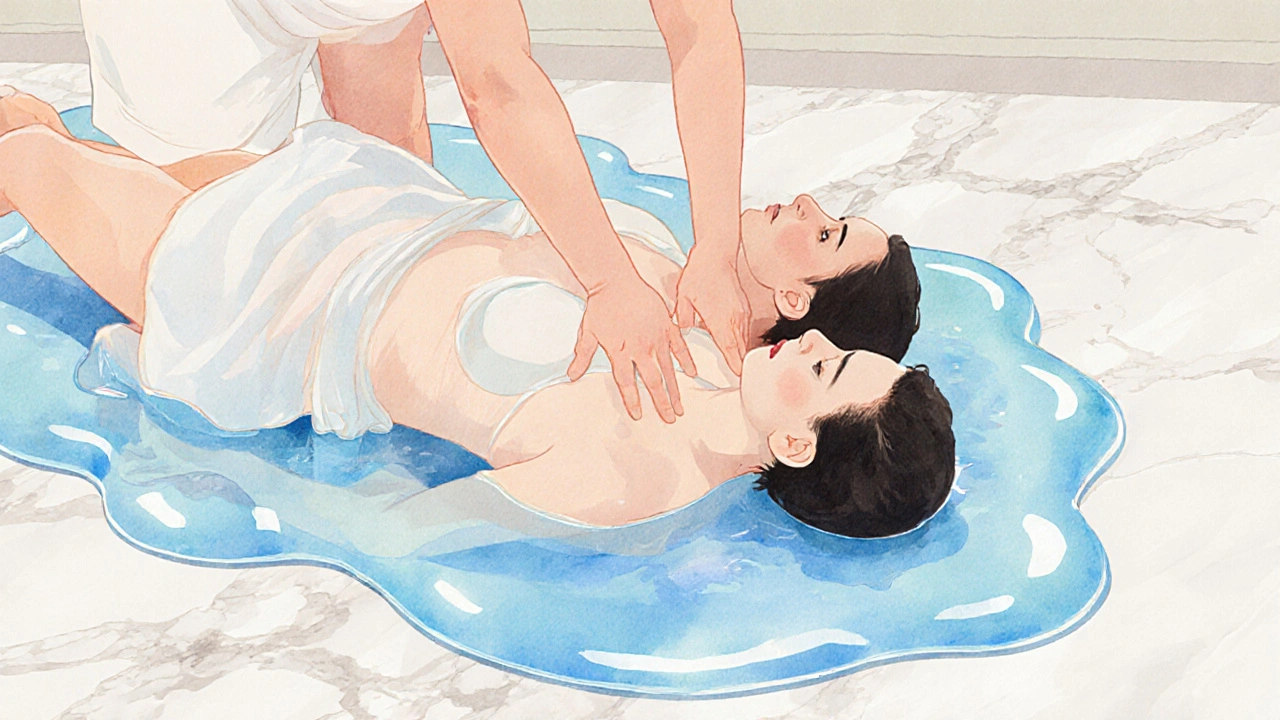
Types of Happy Ending Massage Available in the United Kingdom
Not all erotic massages are the same. Here’s a quick rundown of the most common variations you’ll encounter in cities like London, Manchester, and Brighton.
- Erotic Massage - General term for any massage that incorporates sexual stimulation.
- Tantric Massage - Focuses on energy work, breathing, and prolonged arousal without necessarily reaching climax.
- Nuru Massage - Uses a slippery, seaweed‑derived gel; the practitioner’s body glides over the client’s, creating full‑body contact.
- Prostate Massage - Targeted at men, stimulates the prostate gland to promote intense pleasure and potential health benefits.
- Yoni Massage - Female‑focused, aims to release tension in the pelvic area and enhance sexual awareness.
How to Find Happy Ending Massage Services in the United Kingdom
Finding a reputable provider requires a mix of online research and street‑level awareness. Here’s a step‑by‑step plan:
- Search niche forums and review sites that specialize in adult wellness. Look for threads that discuss “safe erotic massage” in specific cities.
- Check the business’s online presence - a professional website, clear contact details, and transparent policies are good signs.
- Read recent client reviews on platforms like Trustpilot or local Reddit communities. Pay attention to mentions of consent, hygiene, and punctuality.
- Verify that the parlour holds a valid massage therapy licence from the UK Council for Massage Therapy.
- Contact the business ahead of time with a polite email asking about session length, pricing, and consent procedures. Their response style tells you a lot about professionalism.
Tip: Many reputable parlours operate in areas like Shoreditch (London), Northern Quarter (Manchester), and the Lanes (Brighton). These districts have a higher concentration of licensed therapists who mix wellness with adult services.
What to Expect During a Session
A typical happy ending massage runs 60‑90 minutes. Here’s a snapshot of the flow:
- Introduction (5‑10 min) - The therapist greets you, confirms consent, and asks about any medical issues.
- Full‑body relaxation (20‑30 min) - Classic techniques like Swedish strokes, kneading, and pressure point work relieve muscular tension.
- Transition (5 min) - The therapist checks in, adjusts lighting, and asks if you’re comfortable moving to a more intimate phase.
- Erotic focus (15‑30 min) - Manual stimulation of erogenous zones, culminating in genital stimulation for climax.
- After‑care (5‑10 min) - The therapist offers water, a brief discussion about the experience, and any post‑session recommendations.
Throughout, clear verbal cues are essential. If anything feels off, you have the right to stop the session at any point.
Pricing and Booking
Prices vary by city, therapist experience, and session length. Expect the following ranges in the UK:
- London: £120‑£200 for a 90‑minute session.
- Manchester: £90‑£150 for 90 minutes.
- Brighton: £80‑£130 for 90 minutes.
Booking is usually done via online forms, email, or secure phone lines. Reputable parlours will not require payment before the session; they may ask for a credit‑card hold to cover no‑show fees.
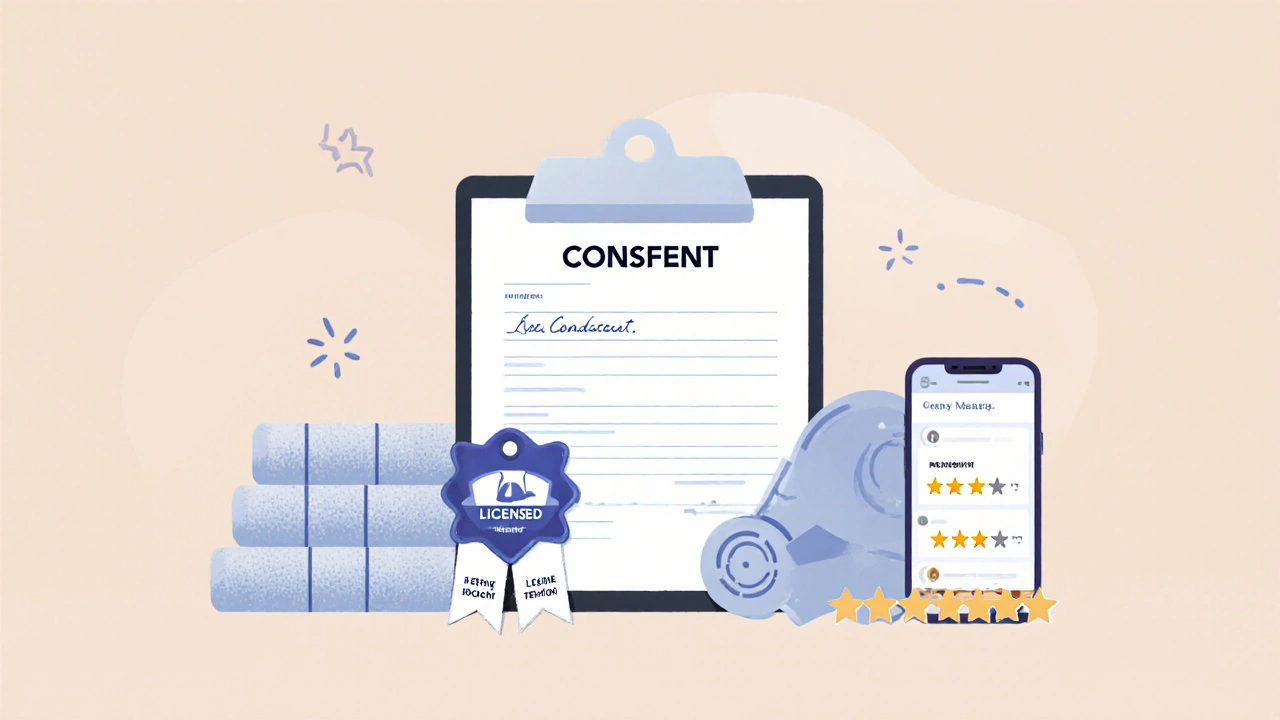
Safety Tips
Staying safe is non‑negotiable. Follow these guidelines:
- Consent first - Both parties must explicitly agree to every step. A written consent form is a good practice.
- Hygiene matters - Look for freshly washed linens, clean towels, and disposable gloves if the therapist uses them.
- Check credentials - Verify the practitioner’s massage therapy licence and any additional certifications for erotic services.
- Set boundaries - Decide beforehand what’s acceptable (e.g., no oral contact, no kissing) and communicate it clearly.
- Trust your gut - If something feels off, leave. Reputable providers respect your decision without argument.
Comparison Table: Happy Ending Massage vs. Nuru Massage in the United Kingdom
| Aspect | Happy Ending Massage | Nuru Massage |
|---|---|---|
| Primary Focus | Sexual climax through genital stimulation | Full‑body slippery contact, often no climax |
| Typical Duration | 60‑90 min | 60‑120 min |
| Legal Status (UK) | Legal if private, must avoid prostitution rules | Legal, no sexual act required |
| Common Settings | Specialized erotic parlours, outcall services | Spas, boutique studios, private rooms |
| Safety Emphasis | Consent forms, clear boundaries, hygiene | Skin‑to‑skin contact, use of hypoallergenic gel |
FAQ: Your Questions About Happy Ending Massage Answered
Is a happy ending massage illegal in the UK?
The act of private consensual sexual activity isn’t illegal, but offering it as a commercial service can breach prostitution or licensing laws if the business isn’t properly registered. Reputable parlours stay within the legal boundaries by treating it as an erotic service rather than prostitution.
How do I know a therapist is trustworthy?
Look for a valid massage therapy licence, clear consent policies, and positive client reviews that mention hygiene and professionalism. A written consent form and a pre‑session email confirming boundaries are strong trust signals.
What should I wear to a session?
Most parlours ask you to arrive in underwear or a swimsuit. Bring a change of clothes if you plan to go out afterward. Comfortable, breathable fabrics are best.
Can I request a specific type of stimulation?
Yes, as long as it’s within the therapist’s comfort zone and complies with the venue’s policies. Clear communication before the massage helps set realistic expectations.
What are the health benefits, if any?
Beyond sexual release, clients often report lower stress hormones, improved sleep, and heightened body awareness. Some studies link regular erotic massage to better pelvic floor health for both men and women.
Call to Action
If you’re ready to explore a happy ending massage with confidence, start by researching licensed parlours in your city, set clear boundaries, and enjoy a safe, consensual experience. Your relaxation journey begins with one informed choice.

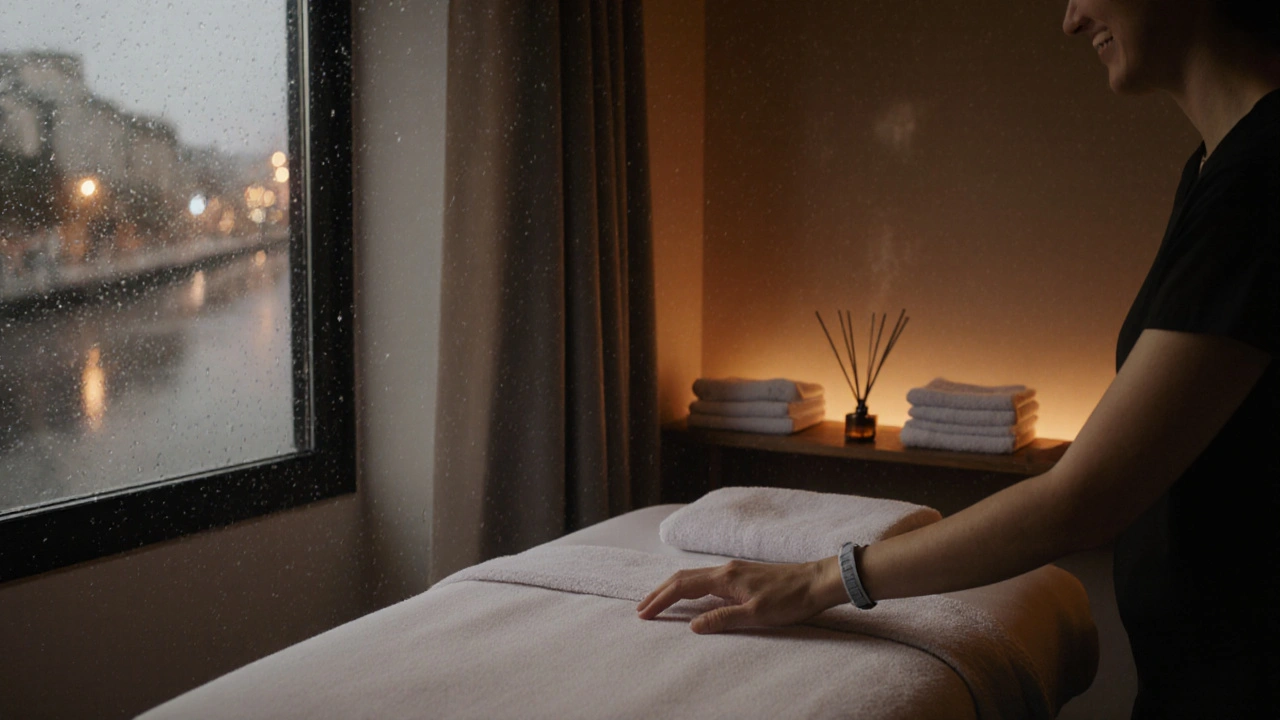


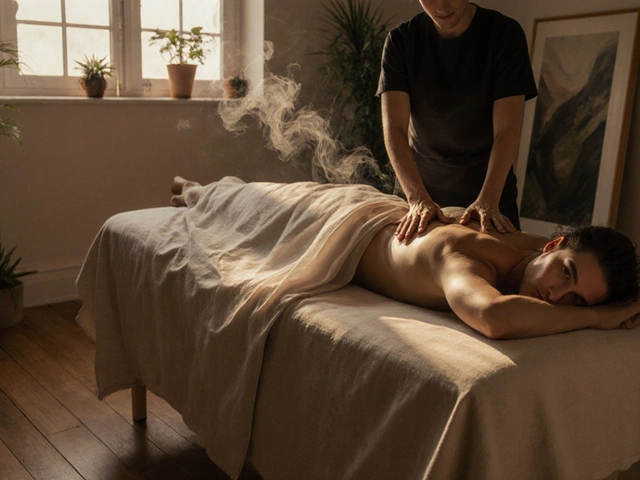
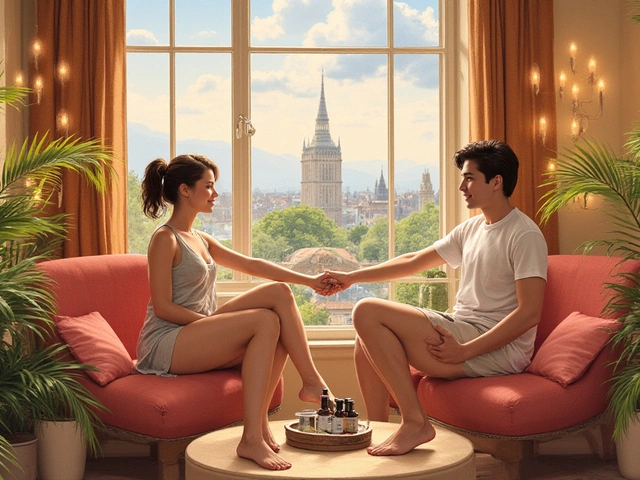

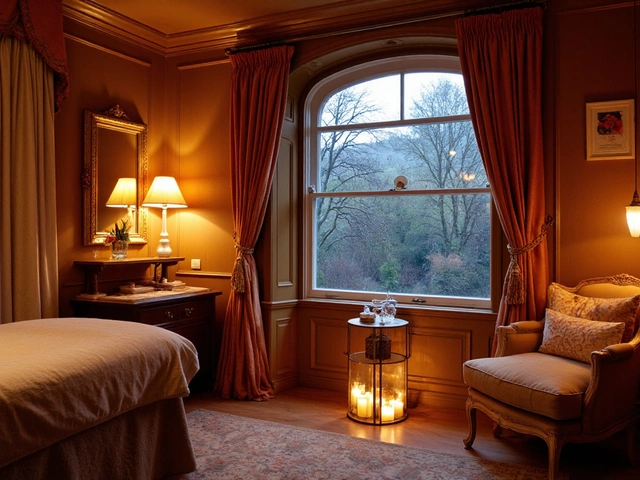

Rebecca Pettigrew
October 25, 2025 AT 17:33First off, the notion of a happy ending massage forces us to confront the shadowy corridors of modern desire, where pleasure and propriety engage in a silent tug-of-war that my mind cannot help but dissect with reverent curiosity; we must ask ourselves why society constructs such rigid walls around an act that, at its core, is merely the pursuit of relaxation and bodily awareness, and yet the moment a therapist's fingertips sketch the map of our most intimate zones, the collective conscience erupts in hysterical alarm as if we have trespassed upon a forbidden altar of sensuality; this paradox, dear readers, reveals the deeper malaise of our cultural fabric, which clings to Victorian prudence while secretly craving the very liberation it condemns, and it is through that tension that the taboo persists, a living testament to our inability to reconcile the spiritual with the carnal in a harmonious equation; consider the historical lineage of erotic touch, from ancient bathhouses that celebrated communal ecstasy to contemporary boutique studios that veil their services in euphemistic branding, each iteration reflecting a persistent human yearning for connection that transcends the superficial veneer of decorum; the legal machinery in the United Kingdom, though ostensibly clear in distinguishing private consensual acts from commercial exploitation, often blurs its own lines when licensing boards and morality clauses collide, leaving entrepreneurs navigating a labyrinth of bureaucratic riddles that only amplify the mystique surrounding these services; furthermore, the psychological dimensions cannot be ignored, for the release of oxytocin and endorphins during such sessions creates a biochemical chorus that whispers promises of stress relief, improved sleep, and heightened creative confidence, benefits that many mainstream wellness practices beg for yet rarely achieve with comparable potency; yet, the media's sensationalist portrayal reduces these nuanced experiences to lurid headlines and scandalous gossip, thereby reinforcing the stigma and discouraging open dialogue, a feedback loop that perpetuates ignorance and fuels the underground nature of the industry; as we stand at the crossroads of personal liberty and communal standards, it becomes imperative to foster informed conversations that demystify the practice, spotlight the importance of consent, hygiene, and professional accreditation, and ultimately empower individuals to make choices unshackled from unfounded shame; in doing so, we may yet transform a once-taboo indulgence into a legitimate facet of holistic well‑being, a bridge between mind, body, and the unapologetic enjoyment of one's own sensual landscape.
Jared Rasmussen
November 3, 2025 AT 22:46In the grand tapestry of societal controls, one observes that the proliferation of happy ending massage establishments is not merely a matter of personal preference but a calculated stratagem orchestrated by shadowy cabals intent on monitoring corporeal intimacy; the regulatory frameworks ostensibly designed to safeguard public decency conceal a covert surveillance apparatus that meticulously records transactional data, thereby granting omnipotent entities the capacity to map the erotic proclivities of the citizenry, a development that, when examined through the lens of civil liberties, evokes profound consternation; moreover, the convergence of digital booking platforms with governmental licensing agencies creates a feedback loop wherein the minutiae of each session-duration, practitioner identity, and even the nuanced parameters of consent-are archived in repositories inaccessible to the layperson but readily exploitable by those who wield power; this, dear interlocutors, underscores the necessity for vigilance, for the veneer of legality may be but a smokescreen obscuring the machinations of a surveillance state that seeks not only to regulate but to subtly influence the very fabric of private desire.
onyekachukwu Ezenwaka
November 13, 2025 AT 05:00To understand the legal side, look at the UK Council for Massage Therapy licensing requirements; a legitimate therapist must hold a valid certificate, keep a clean workspace, and follow health regulations, which includes hygiene and consent forms; if a business mixes erotic services without proper licensing, it can be flagged for prostitution offenses, so always check the licence number on the website or ask for proof before booking.
Hamza Shahid
November 22, 2025 AT 11:13Honestly, the hype around "safe" happy endings is overblown; most places are just exploiting curiosity for cash; if you think a therapist will respect your boundaries because they sign a form, think again-most will push limits to get a tip, and you end up feeling used.
Kate Cohen
December 1, 2025 AT 17:26Look, when we talk about the taboo it’s really about the power dynamics that society imposes on our bodies 😏 you know how we’re told to be modest but then we see ads that whisper about secret pleasures 🧐 this double standard fuels the obsession with the “forbidden” and makes us chase that thrill like moths to a flame 🦋 the truth is simple we all want relief and intimacy but the system tries to shame it so we end up hiding in the dark corners of the internet where we can’t be judged 😤 yet it’s those same corners that give us the freedom to explore safely if we follow the right steps and set clear boundaries 📜 remember consent is king and hygiene is queen, together they rule the kingdom of pleasure 👑
Jumoke Enato
December 10, 2025 AT 23:40the problem with this whole discussion is that people forget that the british nationalist spirit demands that we protect our own culture from foreign influences and the influx of these eastern massage practices is a clear sign of cultural erosion it is a stealth invasion of moral values cloaked in the language of consent and wellness the legislation is deliberately vague to allow the elite to profit while the common folk are left to navigate a moral minefield we must stand firm and demand stricter enforcement of traditional British standards and push back against the silent acceptance of these services
Marc Houge
December 20, 2025 AT 05:53You got this-research well, set boundaries, and enjoy a safe experience!